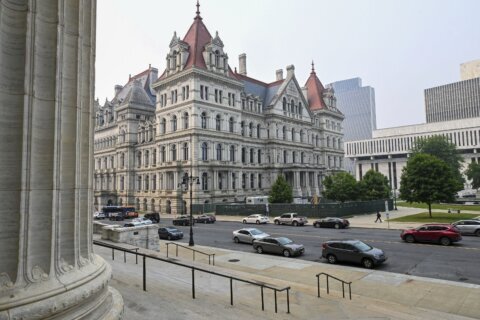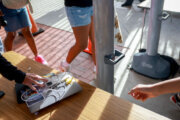PRISTINA, Kosovo (AP) — Kosovo’s prime minister on Wednesday said that fully reopening a bridge in Mitrovica would be another step toward free movement and wasn’t a threat to anyone. But Western powers are wary of the potential move, saying it could increase tensions.
The bridge has been closed to passenger vehicle traffic for more than a decade, with minority ethnic Serbs time and again erecting barricades since 2011 because they say “ethnic cleansing” would be carried out against them if ethnic Albanians could freely travel over the bridge into their part of the city in northern Kosovo.
Mitrovica is divided into a Serb-dominated north and ethnic Albanian south of the city, and the two sides rarely mix.
Kosovo was a former Serbian province until a 78-day NATO bombing campaign in 1999 ended a war between Serbian government forces and ethnic Albanian separatists in Kosovo, which left about 13,000 dead, mainly ethnic Albanians, and pushed Serbian forces out. Serbia doesn’t recognize Kosovo’s 2008 independence.
At the moment, the bridge is open to commercial and foot traffic. Last year, the Mitrovica local assembly decided that the bridge should fully reopen, including passenger vehicles.
But the proposal has caused concern among Western powers, which fear a revival of the interethnic conflict there if there is a free flow of vehicles crossing the bridge.
Kosovo Prime Minister Albin Kurti said that freedom of movement, the rule of law and peace and security were the fundamental basis for wanting to fully reopen the bridge opening.
“The bridge opening is against no one, least so against our partners,” Kurti said at a Cabinet meeting. “Kosovo is a normal state and its bridges should be normal, too, which means open.”
The bridge on Iber River divides the city of Mitrovica. Last week, ethnic Serbs in Kosovo’s north protested against the opening of the bridge, which they say has protected them from ethnic cleansing. Serbia’s government also has called for the bridge to remain closed.
The NATO-led Kosovo Force peacekeepers, known as KFOR, urged Pristina to refrain from unilateral actions that “could create tensions.”
Since last year’s unrest in northern Mitrovica, KFOR has increased its numbers and equipment along the Kosovo-Serbia border, including at the main bridge on the Iber River.
“We reaffirm that any decision concerning the bridge over the Ibar/Ibër River must be taken through political dialogue and in a coordinated manner,” it said in a statement on Tuesday.
Last week, five Western powers — the United States, United Kingdom, France, Germany and Italy — called on Kosovo to refrain from opening the bridge at the moment.
U.S. Ambassador Jeffrey Hovenier on Tuesday said that Washington “believes strongly that this is not the time to reopen the bridge to vehicle traffic.”
“There’s real risk associated with taking this action right now and we believe this risk increases the threat, potential violence, other problems, both for the local community, but also for NATO soldiers, who are working to provide peace and security in Kosovo,“ he said.
Kosovo-Serbia ties remain tense and the 13-year-long normalization talks facilitated by the European Union have failed to make progress, especially following a shootout last September between masked Serb gunmen and Kosovo police that left four people dead.
The EU and the U.S. are pressing both sides to implement agreements that Serbian President Aleksandar Vučić and Kurti reached in February and March last year.
___
Follow Llazar Semini at https://x.com/lsemini
Copyright © 2024 The Associated Press. All rights reserved. This material may not be published, broadcast, written or redistributed.







